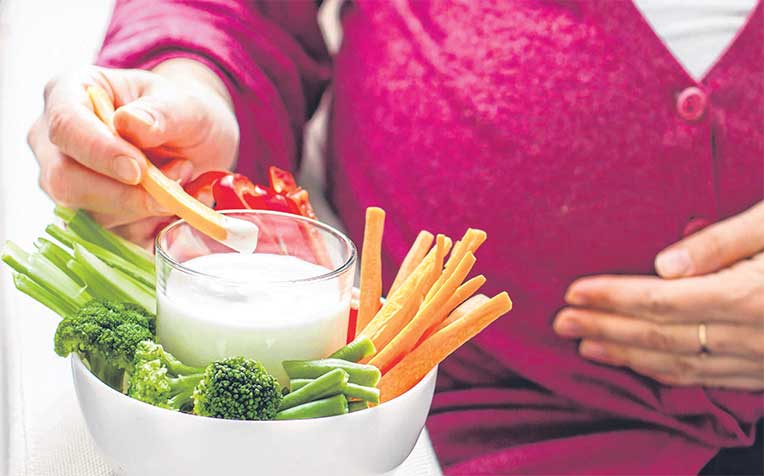
rich in antioxidants may prevent oxidative damage to the egg and sperm.
A healthy, balanced diet can help increase a couple’s chances of conceiving and also contribute to the baby’s health.
During pregnancy, an adequate intake of macro-nutrients and micro-nutrients will promote fetal growth and development, and reduce adverse outcomes, said Dr Tan Toh Lick, a consultant obstetrician and gynaecologist at Thomson Women’s Clinic (Jurong East).
If you are trying to get pregnant, it is best to eat a varied diet, said Dr Tan and Ms Christine Ong, senior principal dietitian at KK Women’s & Children’s Hospital, who spoke at a recent talk, What Should I Eat If I’m Planning To Get Pregnant?.
Here, they share some tips:
CHANGE YOUR DIET
-
Pile on the fruit and vegetables
Ms Ong: These are rich in antioxidants and are a key component of a balanced diet. Antioxidants may prevent oxidative damage to the egg and sperm, hence increasing the chances of healthy sperm fertilising the egg.
Fruit and vegetables that are high in antioxidants such as vitamin C include capsicum, guava, spinach, kiwi, broccoli, asparagus, orange, papaya and banana.
Foods that are high in folate are spinach, broccoli, orange and mango, while those high in lycopene are red or orange fruits and vegetables like watermelon, papaya and tomatoes.
-
Include high-protein foods
Ms Ong: A balanced diet should include high-protein foods such as meat, beansand deep-sea fatty fish.
Omega-3 fatty acids found in foods such as salmon, walnuts, flax and chia seeds may improve sperm motility and vitality.
Zinc-rich foods such as oysters, beef, pork, chicken, pumpkin seeds and wheat germ may improve sperm quality as well.
Dr Tan: Docosahexaenoic acid or DHA is necessary for the development of the brain, nervous system and eye.
Fish is a good source of nutrients, including DHA. Fish consumption during pregnancy and breastfeeding may have beneficial effects on the neurodevelopmental and cognitive outcome of the child.
However, deep-sea fish such as shark, swordfish, marlin and tuna have higher levels of naturally occurring mercury and should be consumed sparingly. High levels of mercury may harm the nervous system of developing foetuses.
-
Limit caffeine intake
Ms Ong: Studies show that women who consume large amounts of caffeine – over 500mg a day – may take over 91/2 months to conceive.
A cup of coffee has 100mg to 140mg of caffeine, while a cup of tea has about 50mg of caffeine.
Caffeine can also be found in smaller amounts in other foods and beverages like cola drinks and chocolate beverages.
It is advisable to limit the intake of high-caffeine drinks such as coffee and tea to two cups a day.
-
Take folic acid supplements
Ms Ong: Folic acid is critical in the early stages of pregnancy and aids the formation of the foetus’ brain and spinal cord. Women should take folic acid supplements one to three months before they plan to conceive.
Folic acid is found in citrus fruit, green leafy vegetables, whole grains, beans and fortified foods such as breakfast cereals.
Dr Tan: Folic acid supplementation is well established in reducing the risk of the baby developing neural tube defects, the abnormal development of the brain and spinal cord.
Women should start taking folic acid supplements at least one month before trying to conceive and continue at least until the end of the first trimester.
The recommended daily dose is 0.4mg (400mcg). Some women, such as those who had a previous pregnancy with a neural tube defect or have diabetes, or are taking anticonvulsants or are obese, should take a dose of 5mg (5,000mcg).
-
Avoid large intake of vitaminsandminerals
Ms Ong: Large doses of some vitamins and minerals can be toxic to the foetus in the first trimester of pregnancy. These include vitamin A, which can cause birth defects when taken in large doses. Food sources of vitamin A are usually safe, except for liver as it is a concentrated source of vitamin A.
Dr Tan: Liver and liver products such as pate and liver roll may contain large amounts of vitamin A. Excess intake of vitamin A beyond 700mcg per day may cause birth defects.
CHANGE YOUR LIFESTYLE
-
Stop or limit alcohol intake
Ms Ong: Women who drink between one and five drinks a week can reduce their chances of conceiving.
In men, excessive alcohol consumption lowers testosterone levels as well as sperm quality and quantity.
-
Stop smoking
Ms Ong: Male smokers can suffer from decreased sperm quality, with lower count and motility.
They may also have a higher number of abnormally shaped sperm. All these would affect the sperm’s ability to fertilise eggs.
As smoking damages the DNA in eggs and sperm, the likelihood of a miscarriage and birth defects is higher among people who smoke.
-
Maintain a healthy body-mass index or BMI
Ms Ong: Obesity (BMI of above 30) as well as being underweight (BMI of less than 18.5) affects fertility in both men and women.
Those who are underweight should consume more servings from each of the four food groups (rice and alternatives, meat and alternatives, fruit and vegetables).
Obese men and women should still eat a healthy, balanced diet, but focus on reducing their intake of additional fats and sugars from fried foods, snacks, desserts and sweet drinks.
Moderate exercise can help people manage weight loss and improve sperm count, motility and morphology.
Contributed by














 Get it on Google Play
Get it on Google Play